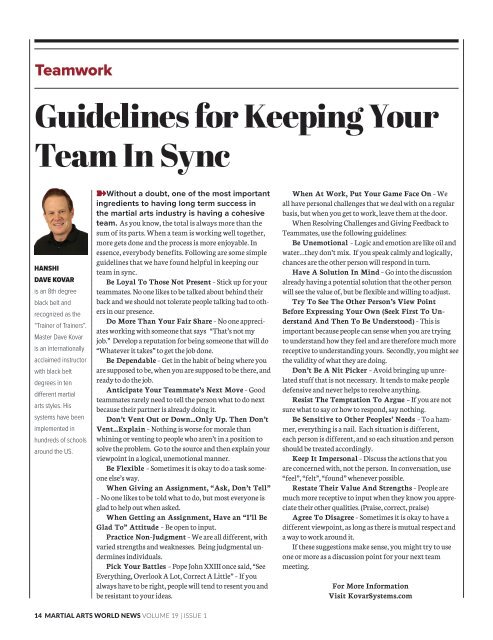Martial Arts World News Magazine - Volume 19 | Issue 1
The #1 Business Resource for the Martial Arts Industry.
The #1 Business Resource for the Martial Arts Industry.
You also want an ePaper? Increase the reach of your titles
YUMPU automatically turns print PDFs into web optimized ePapers that Google loves.
Teamwork<br />
Guidelines for Keeping Your<br />
Team In Sync<br />
HANSHI<br />
DAVE KOVAR<br />
is an 8th degree<br />
black belt and<br />
recognized as the<br />
“Trainer of Trainers”.<br />
Master Dave Kovar<br />
is an internationally<br />
acclaimed instructor<br />
with black belt<br />
degrees in ten<br />
different martial<br />
arts styles. His<br />
systems have been<br />
implemented in<br />
hundreds of schools<br />
around the US.<br />
➽Without a doubt, one of the most important<br />
ingredients to having long term success in<br />
the martial arts industry is having a cohesive<br />
team. As you know, the total is always more than the<br />
sum of its parts. When a team is working well together,<br />
more gets done and the process is more enjoyable. In<br />
essence, everybody benefits. Following are some simple<br />
guidelines that we have found helpful in keeping our<br />
team in sync.<br />
Be Loyal To Those Not Present – Stick up for your<br />
teammates. No one likes to be talked about behind their<br />
back and we should not tolerate people talking bad to others<br />
in our presence.<br />
Do More Than Your Fair Share – No one appreciates<br />
working with someone that says “That’s not my<br />
job.” Develop a reputation for being someone that will do<br />
“Whatever it takes” to get the job done.<br />
Be Dependable – Get in the habit of being where you<br />
are supposed to be, when you are supposed to be there, and<br />
ready to do the job.<br />
Anticipate Your Teammate’s Next Move – Good<br />
teammates rarely need to tell the person what to do next<br />
because their partner is already doing it.<br />
Don’t Vent Out or Down…Only Up. Then Don’t<br />
Vent…Explain – Nothing is worse for morale than<br />
whining or venting to people who aren’t in a position to<br />
solve the problem. Go to the source and then explain your<br />
viewpoint in a logical, unemotional manner.<br />
Be Flexible – Sometimes it is okay to do a task someone<br />
else’s way.<br />
When Giving an Assignment, “Ask, Don’t Tell”<br />
– No one likes to be told what to do, but most everyone is<br />
glad to help out when asked.<br />
When Getting an Assignment, Have an “I’ll Be<br />
Glad To” Attitude – Be open to input.<br />
Practice Non-Judgment – We are all different, with<br />
varied strengths and weaknesses. Being judgmental undermines<br />
individuals.<br />
Pick Your Battles – Pope John XXIII once said, “See<br />
Everything, Overlook A Lot, Correct A Little” – If you<br />
always have to be right, people will tend to resent you and<br />
be resistant to your ideas.<br />
When At Work, Put Your Game Face On – We<br />
all have personal challenges that we deal with on a regular<br />
basis, but when you get to work, leave them at the door.<br />
When Resolving Challenges and Giving Feedback to<br />
Teammates, use the following guidelines:<br />
Be Unemotional – Logic and emotion are like oil and<br />
water…they don’t mix. If you speak calmly and logically,<br />
chances are the other person will respond in turn.<br />
Have A Solution In Mind – Go into the discussion<br />
already having a potential solution that the other person<br />
will see the value of, but be flexible and willing to adjust.<br />
Try To See The Other Person’s View Point<br />
Before Expressing Your Own (Seek First To Understand<br />
And Then To Be Understood) – This is<br />
important because people can sense when you are trying<br />
to understand how they feel and are therefore much more<br />
receptive to understanding yours. Secondly, you might see<br />
the validity of what they are doing.<br />
Don’t Be A Nit Picker – Avoid bringing up unrelated<br />
stuff that is not necessary. It tends to make people<br />
defensive and never helps to resolve anything.<br />
Resist The Temptation To Argue – If you are not<br />
sure what to say or how to respond, say nothing.<br />
Be Sensitive to Other Peoples’ Needs – To a hammer,<br />
everything is a nail. Each situation is different,<br />
each person is different, and so each situation and person<br />
should be treated accordingly.<br />
Keep It Impersonal – Discuss the actions that you<br />
are concerned with, not the person. In conversation, use<br />
“feel”, “felt”, “found” whenever possible.<br />
Restate Their Value And Strengths – People are<br />
much more receptive to input when they know you appreciate<br />
their other qualities. (Praise, correct, praise)<br />
Agree To Disagree – Sometimes it is okay to have a<br />
different viewpoint, as long as there is mutual respect and<br />
a way to work around it.<br />
If these suggestions make sense, you might try to use<br />
one or more as a discussion point for your next team<br />
meeting.<br />
For More Information<br />
Visit KovarSystems.com<br />
14 MARTIAL ARTS WORLD NEWS VOLUME <strong>19</strong> | ISSUE 1

















